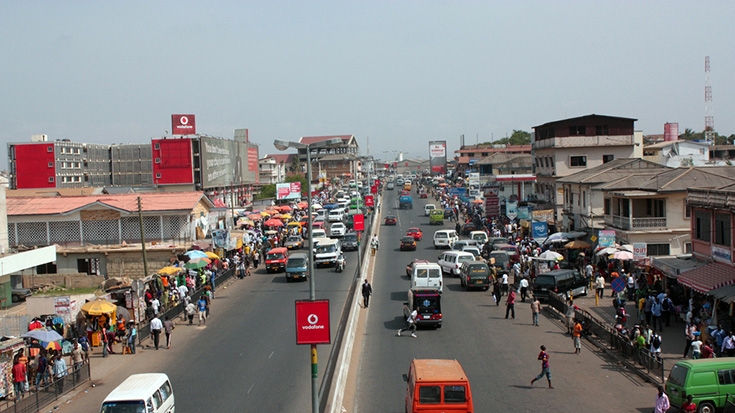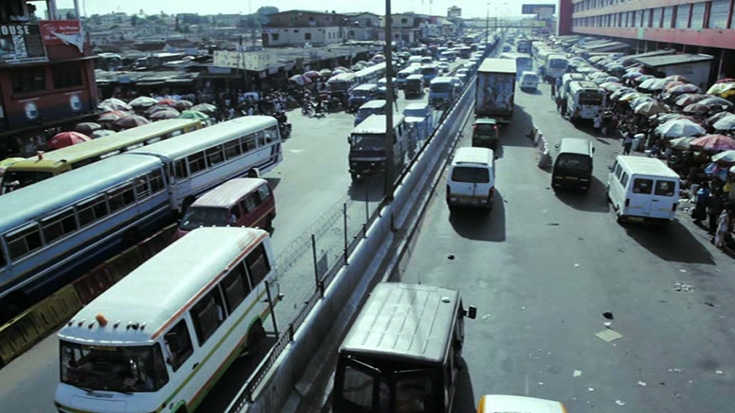Over the last three decades, Ghana’s urban population has more than tripled, rising from 4 million to nearly 14 million people, and outpacing rural population growth. The country is moving steadily and uniformly –all regions have experienced this growth—toward cities. In fact, Ghana’s urban population growth has been faster in its smaller cities than its larger ones. Can this increasing pool of urban residents secure good jobs, access affordable housing, clean water and public transport?
On May 14, 2015, the World Bank released “Rising through Cities in Ghana”, a new urbanization review of the country. The report analyzes Ghana’s rising urbanization challenges and a framework to successfully overcome them.
Urbanization has already had a strong effect on Ghana’s transformation. Since 1984, annual GDP has grown rapidly, averaging 5.7 percent. This is no coincidence: no country in the industrial age has achieved significant economic growth without urbanization, and globally, there exists a strong correlation between per capita income and urbanization. This rapid economic growth has resulted in a reduction in poverty in both rural and urban areas of Ghana.
Urbanization has also enabled higher quality education to reach a larger proportion of the population, and quality of life has improved for millions of Ghanaians as a result of greater access to urban services. Migration to urban areas has led to a structural transformation away from subsistence agriculture that has boosted Ghana’s economy, with an increase in industry and service jobs from 38 to 59 percent between 1992 and 2010.
Yet while Ghana’s transformation has been momentous, it is not unique: other countries at comparable levels of development have gone through a similar process.
In the last few years, Ghana has started to see the side effects of rapid urbanization, including congestion, unregulated urban expansion, limited access to services and affordable quality housing, and institutions unable to cope with the rapid transition. Ghana is now at a crossroads where, depending on the approach it takes to managing urbanization, it will ensure its growth is accompanied by better productivity and inclusion that will improve the lives of all its citizens, or, as President Mahama noted a year ago, it could create “a grave danger” if it is not properly planned for.
By focusing on common themes and confronting them proactively, Ghana’s urbanization challenges are surmountable. In particular, Ghanaian authorities need to generate new sources of productivity to create more efficient urban economies and create livable and inclusive cities that provide more equal access to housing, services, and opportunity for all citizens. The report proposes four priority policy areas:
Strengthen land use management and planning in municipal and metropolitan areas by valuing land to create effective land markets and coordinating land development with infrastructure and affordable housing;
Improve connectivity between and within cities, with affordable public transport systems for people to get to work and minimize congestion, and to benefit producers and consumers in urban and rural areas. This would involve increasing intermodal coordination in intercity connectivity and developing high-capacity public transport systems in large metropolitan areas;
Mobilize existing, unharnessed revenue potentials in urban areas and find new sources of revenue to finance the mentioned land use planning, transport connectivity, and affordable housing, as well as the provision of universal basic services;
Improve institutional strength and coordination to adequately support the reforms recommended above. In addition to developing human capital, Ghana should improve interjurisdictional coordination and metropolitan management, complete decentralization reforms, and further develop public-private partnerships.
Ghana is halfway through urbanization. It is one of the few countries in Africa that has been largely successful in harnessing the gains yielded by urbanization early in this process. The time is now for Ghana’s leaders to shape the second half of this transformation in a way that creates opportunities for all.
Yusupha B. Crookes is the Country Director of The World Bank for Ghana, Liberia, Sierra Leone, and Guinea, AFC.
Ede Jorge Ijjasz-Vasquez is the Senior Global Director for the World Bank Group’s Social, Urban, Rural and Resilience Global Practice.
In-depth discussion of these issues can be found in the World Bank’s Ghana Urbanization Review, Rising through Cities in Ghana.


